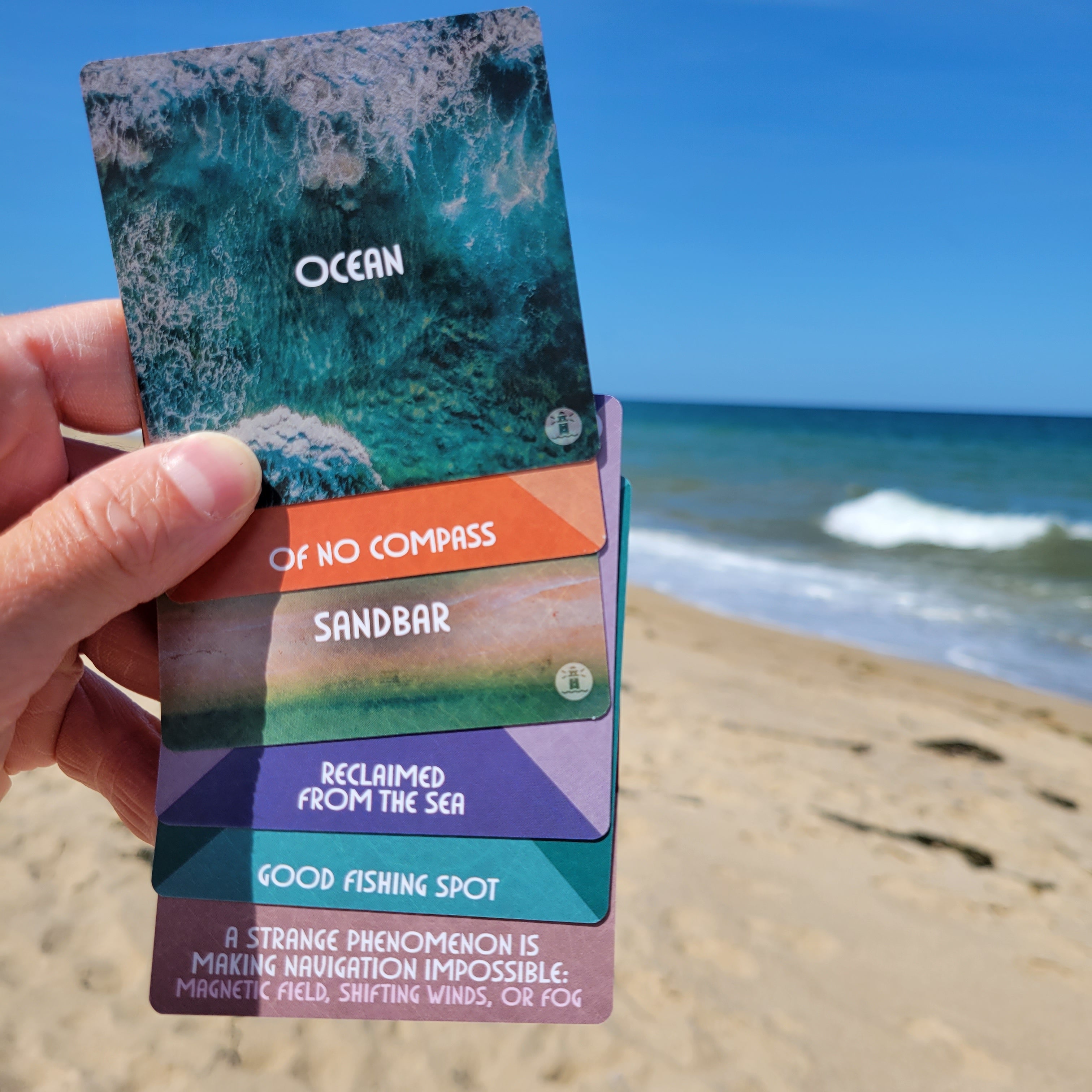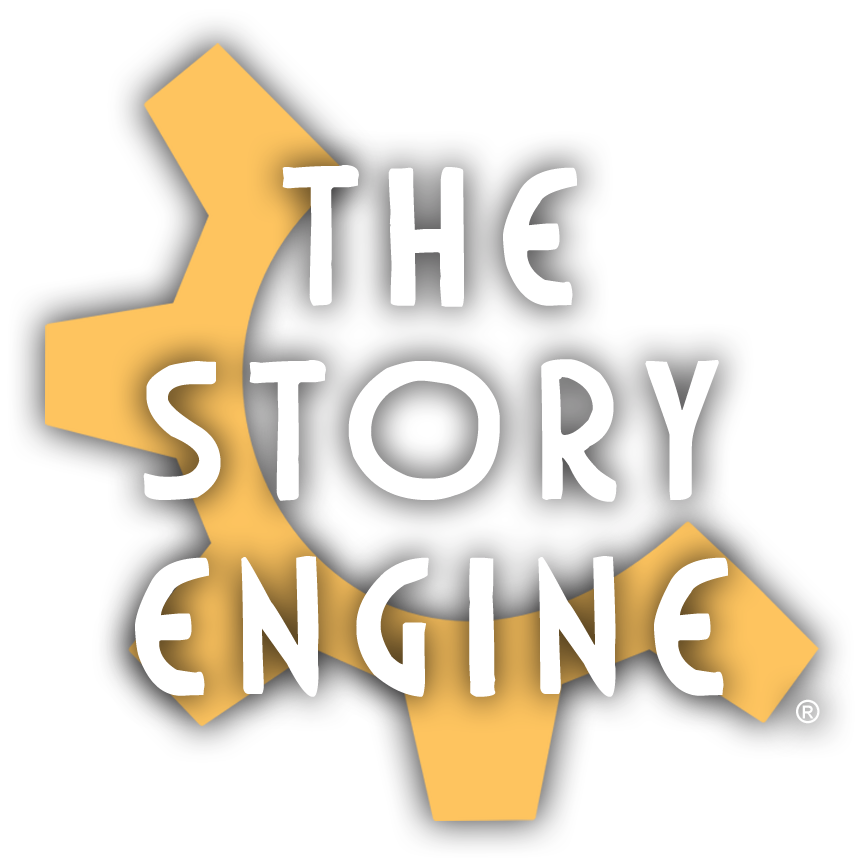By Eric Weiss
Here at The Story Engine, we love writing prompts. If you follow us on social media, you’ll know that we also love sharing prompts with like-minded artists. As Community Manager, I post a new one every week on our social channels, along with some questions to highlight some of the possible paths that you could go down to turn a prompt into a story.
This time around, I thought it’d be fun to write some microfiction of my own to show you how I’d answer those questions myself – and share some of the thought process that went into the result. You won’t interpret the prompt in the same way I did, but seeing how I approach a prompt might give you a new way to approach a prompt of your own!
For reference, here’s the prompt that this story is based on (shared on social media in September):

Prompt summary: The Ocean of No Compass was reclaimed from the sea, is a good fishing spot, and is experiencing a strange phenomenon making navigation impossible (magnetic field, shifting winds, or fog).
And here’s the story that it led to. I’ll take you behind-the-scenes with some behind-the-scenes thoughts at the end!
Adrift on the Ocean of No Compass
“I’m not paying you to play with that piece of junk!”
Ross put the compass in his pocket and splashed more water across the deck. The last of the blood and fish guts slid off the boat and back into the sea.
“It’s my first time here,” he said. “I wanted to see if it really is an ocean of no compass.”
“No compass, no sonar, no GPS – anything you’d use to find your way stops working as soon as you bring it here. Even maps change and stars move when you try to look at them. Been this way for three years, and still no one knows why.”
“How do you navigate?” Ross asked.
“Easy. Just stay in sight of shore.” The Captain uncoiled the rope, and shoved away from the mooring post. The entire sandbar was lined with them, though most were empty now that the sun was dropping. Lighthouses flared in the distance, shining on every jetty and at regular intervals along the coast.
Ross took the compass out again as the boat chugged back toward the port. The needle was going haywire – sometimes spinning in circles, sometimes pointing in every direction other than north. The boat circled the southern end of the sandbar as night set in.
“You see the port,” the Captain yelled from the stern. Ross glanced up from the compass, and saw only darkness on the horizon. The lights of streets and pubs and homes that had dotted the landscape only moments ago were nowhere to be seen.
“Um. No, Captain.”
“What’s that?”
“No Captain!”
The Captain cut the engine. The boat rocked as gentle waves sloshed against the boat. Ross felt panic rising in his throat.
“What are we going to do?” he asked.
The Captain fired the engine back up and turned toward the west.
“Only thing we can do,” the Captain said. If she was worried, she wasn’t showing it. “We’ll tie up at the sandbar and wait ‘til morning. Hope you don’t mind fish for dinner.”
Ross put the compass away and prepared the rope, keeping an eye out for one of the wooden posts. The sandbar seemed like it was too far away. There were still hours to go until the dawn.
Behind the Scenes
Now that you’ve read the story, let’s talk about this prompt. For starters, I was already working with a theme for this one. I used The Worlds of Tides and Tidings Coastlines Expansion because I was going to the beach, and I knew that it would give me lots of nautical keywords that would be suitable for an ocean backdrop. I chose cues that made sense for my real-world setting, and quickly ended up with something that fit together reasonably well.
Turning it into a story required a little more thought. I tend to gravitate toward fantasy settings instead of modern ones, and that’s where my mind went when I first read this prompt. An Ocean of No Compass seems like it should be covered with tall wooden ships because those are the kind of ships that were around when compasses were still used as a primary navigational tool. It just felt too obvious for what I had in mind. There are lots of stories about old ships that got lost at sea, and those early ideas all felt like something I’d read or seen before.
Shifting the time period and expanding the concept helped me unlock the prompt. On its own, an ocean where compasses (and only compasses) don’t work isn’t all that interesting. There are lots of other navigation options, from stars to more modern tech, all of which would mitigate the impact on seafarers.
On the other hand, an ocean that can’t be navigated through any means is a much more terrifying prospect. Jumping to a modern time period amplifies the effect. The ocean used to be an unknowable place, where there could monsters beyond the horizon. Technologies like GPS and sonar helped us filled in the blanks. Taking those tools away restores that sense of mystery, and once again leaves people at the whims of a vast and menacing sea. The rest of the choices I made were intended to increase that sense of unease, with hints of the supernatural (the effect disrupts technology and the natural world alike) and some kind of consciousness (insofar as it affects navigational instruments but not the engine).
From there, I simply tried to figure out how everyday people would adapt if faced with such a phenomenon. The ocean is too valuable a resource to give up entirely, both for food and transportation. However, anyone on a boat would need to rely on line of sight, making lighthouses and sandbars important landmarks that extend the coastline and allow people to go into deeper waters (and catch bigger fish) while remaining in view of shore.
Once I had my setting, the Advent card provided a good entry point for the story itself. It takes the concept one step further and asks what would happen if line of sight was taken away. That would be especially scary for anyone that was already at sea when it happened, and I decided to try to capture that specific moment with two characters who are doing a job and getting on as best they can.
Thanks for reading! Feel free to tag us on social media or join us on The Story Engine Creative Collective Discord server to let us know what you’d do differently!
P.S. There’s no significance to the name Ross. My character names tend to be chosen at random.

